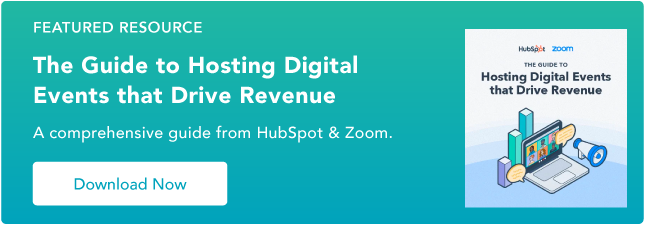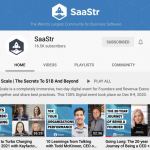- Like
- SHARE
- Digg
- Del
- Tumblr
- VKontakte
- Flattr
- Buffer
- Love This
- Save
- Odnoklassniki
- Meneame
- Blogger
- Amazon
- Yahoo Mail
- Gmail
- AOL
- Newsvine
- HackerNews
- Evernote
- MySpace
- Mail.ru
- Viadeo
- Line
- Comments
- Yummly
- SMS
- Viber
- Telegram
- JOIN
- Skype
- Facebook Messenger
- Kakao
- LiveJournal
- Yammer
- Edgar
- Fintel
- Mix
- Instapaper
- Copy Link
Think back to the last event you attended.
Was it a conference or trade show? An intimate seminar or startup launch party hosted online? How about a fun, socially-distanced 5K or golf outing?
These events are all very different, but to the brands or organizations who hosted them, they all had a common purpose: to entertain and engage attendees — a.k.a. potential customers.
Event marketing is a highly valuable strategy for all kinds of businesses, from technology and education to non-profit, medicine, and retail.
Not only do events benefit their hosts and sponsors, but they also enrich the lives of their attendees. Events inspire, teach, intrigue, entertain, and bring people together in a way unlike most other marketing efforts.
That’s why we created this guide — to equip you to leverage event marketing for your own business. Keep reading to get started or use the chapter links below to jump ahead.
What is event marketing?
Event marketing is planning, organizing, and executing an event for the purpose of promoting a brand, product, or service. Events can take place in-person or online, and companies can either host an event, attend as an exhibitor, or participate as a sponsor.
Event marketing refers to a variety of events. You could organize a small roundtable of seven to 10 guests, partner with another brand to sponsor a 5K, or set up an exhibit at a major trade show — or host one of these online.
You could host a multi-day event that attracts thousands of attendees, sponsors, and speakers … like INBOUND. INBOUND 2020 hosted sessions entirely online and attracted thousands of attendees around the world.
It doesn’t quite matter the size of or platform for your event as long as you’re bringing value to your customers, potential customers, and brand. We’ll talk more about how to build an event marketing strategy below.
Types of Event Marketing
In the meantime, let’s go over some of the different types of event marketing your company could host, sponsor, or attend. Note that all of these events can take place virtually, too.
Conferences
Conferences are large events typically organized and hosted by one major company and sponsored by a long list of smaller brands and businesses. Conferences are valuable for both B2B and B2C brands. These events typically offer the most dynamic agendas, filled with speakers, workshops, and networking opportunities.
Trade Shows and Expositions
Trade shows or expositions (expos) are large events organized around a specific industry or type of product, such as sales technology or medical devices. Trade shows give companies a chance to show off their products and services and typically bring in the highest number of qualified leads. Whereas conferences are open to the public, trade show attendees are typically pre-qualified buyers, company representatives, and salespeople.
Seminars
Seminars (often called webinars when hosted online) are valuable, education-centric events attended by a small number of people. They involve discussions, lectures, and intimate networking opportunities.
Roundtables are similar to seminars, but usually have even fewer attendees of comparable “levels”, such as CEOs, surgeons, or teachers. Both events typically last no more than one day.
Pop-Up Shops
Pop-up shops are temporary retail spaces that give companies the opportunity to sell their products in a controlled environment. They’re typically organized by e-commerce brands that don’t have a full-time brick-and-mortar storefront. Pop-up shops also allow otherwise digital brands to bring their brand to life through a physical, immersive setting for their customers.
Launch Parties and Celebrations
Launch parties or celebrations are small, personal events held at the launch of a new business, upon a big announcement, or to simply celebrate a success or milestone. Some companies put on a yearly party to host and entertain customers or clients. While these types of events shouldn’t be centered on a product or brand, a simple speech or presentation can help align the event with a company and remind attendees why they’re there.
Workshops
Workshops are similar to seminars and roundtables in that they’re focused on sharing knowledge and educating attendees. But unlike seminars and roundtables, they’re typically open to the public. Workshops can be offered both virtually and in-person, and while they aren’t traditionally promotional, they’re usually centered around a topic relevant to the business … which makes a company seem more credible in their field.
Other types of event marketing include job fairs, customer-only conferences, networking sessions, VIP experiences, sponsorships, awards events, and competitions (like 5Ks or golf outings).
There are so many possible ways to market your business and products through events because events work.
In a recent article on the ultimate marketing advice, multiple experts mentioned that events were the best way to connect with your audience and grow your brand. Here’s a direct quote from Kenny Nguyen of ThreeSixtyEight (who spoke at INBOUND):
…businesses will utilize event strategies more than ever before as human experiences will be how companies choose to differentiate themselves, especially those that can’t do so through technologies. The key to any great event strategy is very simple —identify the memory you want attendees to walk away with and work backward.”
Events work because they’re different than every other type of marketing. They’re immersive, entertaining, and memorable. They’re also useful for businesses in any industry
Benefits of Event Marketing
Event marketing helps companies be successful — we’ve proven this above.
But how do they do that specifically? Why should you invest in this strategy for your business? Here are some distinct benefits of event marketing.
Events marketing generates business.
Companies choose to invest in event marketing because events inherently generate new business and revenue opportunities — 95% of marketers believe that in-person events can have a major impact on achieving their company’s primary business goals.
As an event host, the registration process alone generates a list of people who are already interested in your product, industry, or at least fall in your target demographic. If you’re participating in or sponsoring an event, you can collect leads through an email list, demo offering, or by running a competition.
Event marketing provides one-on-one customer engagement.
Lots of today’s software and e-commerce businesses never get to meet their customers or clients in person. That’s where event marketing is beneficial.
A 2020 Bizzabo study found that 93% of marketers believe in-person events provide attendees with a valuable opportunity to form connections in an increasingly digital world.
Engaging customers and potential customers at events initiates personal interactions. These personal, one-on-one interactions build brand loyalty and help customers humanize your brand. Events also provide a reprieve from the distractions of daily work — meaning you can capture a client’s attention better than over a phone call or in-office pitch. With that attention, you have a chance to sell — or upsell — your products and services.
Event marketing builds brand awareness.
Hosting or participating in events is a key way for companies to establish and grow their brand. 64% of event marketers reported that the primary reason for hosting events is brand awareness for their company or products.
Event marketing allows you to associate a physical identity and aesthetic with an otherwise digital brand. Like with pop-up shops, events provide a truly immersive experience at which consumers and customers can get a real feel for your brand and what it looks like in person.
The best part about using events to build brand awareness? People talk about events. Consumers, customers, media, bystanders, and influencers talk about events in person, on social media, in the press … you name it, making events a fantastic way to educate and alert people of your brand and products.
Event marketing encourages product and industry education.
Regardless of what type of event your company hosts or participates in, there’s most likely an education component. That’s what makes event marketing so successful — they don’t focus solely on a brand or product.
Instead, they focus on educating and entertaining a demographic or industry … and promote products and services on the side. (In fact, this makes for great marketing across the board.)
Event Marketing Plan
Now, let’s talk about how you can implement your next event. Your events should have a marketing plan separate from other efforts you do for your business.
You can cross-promote (i.e. share event information on company social media and vice versa), but it’s wise to detail your event marketing as a standalone campaign strategy.
Here are some questions to help you build your next event marketing strategy.
What are your SMART goals? What’s your budget?
SMART goals stand for specific, measurable, attainable, relevant, and timely. Keeping your goals SMART helps you avoid running with vague goals like “bring in leads.”
SMART goals have a dual purpose: to give you direction when planning and implementing your event and to help you decide whether or not your event was a success (and if it wasn’t, to know how to improve).
An example of a SMART event marketing goal would be to “grow our prospective leads list for our new product by 100 names by the end of the event.”
This goal is specific (prospective leads for only the new product), measurable (100 names), attainable and relevant (assuming the event is relevant and there are more than enough attendees to get 100 names), and timely (by the end of the event).
Note: Don’t limit your event to one single goal. You should also set intangible goals like “strengthen relationships” and “engage prospective customers,” but in terms of creative and fiscal decisions, use your SMART goals to guide you — and to measure on the backend.
Lastly, take some time to define your event marketing budget. This is crucial as it’ll likely be the deciding factor on everything from the venue to the entertainment to the website.
What’s your event’s theme, brand, and schedule?
To market your event, you must know what information and content to market. Before moving further, establish your event’s name, theme, brand, and purpose. Why should people attend? What will they gain? Is your event an offshoot of your company, or is it a standalone brand?
Next, figure out where and when your event will take place. These will likely be the most-asked questions by attendees.
Then, research and outline your event’s schedule, such as keynote speakers, workshop sessions, entertainment portions, and times to gather and network.
You don’t have to secure all of these before you start promoting your event, but you should at least have an idea of who will be there and what you’ll offer for attendees.
Who are you marketing to? How will you reach them?
Define your target audience. Who would benefit most from attending your event? What kinds of people would enjoy your workshops, learn from your speakers, and engage your sponsors?
Establishing your audience will help you target and invest in the proper marketing channels. Social media and your event website are given channels in today’s digitally-saturated market. If your event is local, consider print advertisements. Consider adding your event to an event listing website like Eventful, Hey Event, and 10times to reach more people.
Event marketing with email
Email is another popular and effective way to promote events. 39% of marketers found that email marketing tools were the greatest contributor to event success.
Email information is easy to collect at registration, and attendees check email, so they’ll easily notice updates and confirmations.
Often times, companies will create separate email addresses and newsletters for their events as a way to keep communication and promotion separate from it others marketing efforts.
This also benefits your attendees — they probably don’t want their inboxes flooded.
What’s your content creation and management plan?
Promoting your event involves a lot of information — what, when, where, why, who, and how, for starters. To properly manage all this information, you must establish a viable plan to create and control it.
Because your event details likely won’t be ready all at once, you’ll be tasked with releasing, updating, and changing information for months leading up to the event. Will you do this via newsletter? Who will be in charge of making sure the website is up-to-date? Will you invest in an event app so attendees have this information in their pocket at all times?
What’s your event marketing timeline?
To engage your audience, it’s best to promote your event throughout the weeks and months leading up to it. It helps to outline a promotion timeline so you know when and what to release. A timeline like this also helps pique your attendees’ curiosity as you release new names or information at different times.
It’s also wise to organize a multi-touch promotion. Include a variety (i.e. email, social media, direct mail, phone calls, print ads, and paid ads) to reach the maximum amount of people.
Simply getting the word out there could make a massive difference in your registrations.
How will you promote and market during the event?
Marketing your event shouldn’t stop when your event begins. Dedicate some resources to promoting your event as it’s happening. Attendees may learn something new about what’s offered, and those who didn’t register will be curious about what they’re missing.
Most companies use social media to engage people while their event is happening. 73% of businesses use social media to promote specific events and features during the event, 55% use it to post photos, and 35% use it to amplify product announcements.
Consider taking Facebook or Instagram Live Video or Live Tweeting during your event.
How will you measure your event success?
In the midst of a bustling event, it’s easy to take a look around and feel good about your attendance and engagement. But is that the best way to evaluate whether your event was a success? Probably not.
Like every other marketing investment, it’s wise to set some key performance indicators (KPIs) against which to measure your event and evaluate its performance.
Here are a few common KPIs for event marketing.
Registrations and check-ins
Not everyone who registers for your event will attend. Compare your registrations to your actual attendance and consider reaching out to a few who registered but didn’t check-in. Take a look at your registration data to see when the most and fewest tickets were purchased and what kinds of tickets were purchased, if you offered a variety of ticket packages or options.
Revenue and cost-to-revenue ratio
How much money did your event bring in? If your event required a paid ticket, gross revenue is an important measure of success. How does that amount compare to what you spent on the event? This comparison will help you better understand the value of your event and the resources offered. Events are expensive, but they’re not worth going in debt for.
Attendee satisfaction
Did your attendees enjoy your event? What did they participate in and enjoy the most? “Satisfaction” may seem like an obscure metric, but understanding the opinions and perspective of your event attendees can help you better understand where your event was a success … and where you could improve. Consider building a survey to ask your attendees about their experience, takeaways, and to calculate a Net Promoter Score (NPS) for your event.
Here’s a direct quote from another expert who provided some marketing advice in a recent piece of ours, Mike Piddock of Glisser spoke at INBOUND:
“Events need to be assessed with hard metrics, rather than just ‘gut-feel’ opinions and feedback forms to rate the coffee.Measure attendee engagement, rather than simply counting who registered and who showed up, as this isa great proxy for the effectiveness of the event.”
Social media mentions/engagement
How often was your event discussed on social media? What was the general consensus around the event? Did your attendees share content that engaged non-attendees? (It’s highly likely — a 2016 study found that 98% of consumers create digital content at events, and this number has likely risen today.) In today’s digital world, social media is a great measure of event success and reach. Take a look at your event mentions on Facebook, Twitter, Instagram, and more. Consider using a hashtag so you can easily track posts.
Lead acquisition and customer conversion
Acquiring leads and converting customers is one of the main benefits of event marketing, so it’d make sense to measure these as KPIs of your event. Make note of how many qualified leads you gain from your event, and then track how many of those leads are converted into paying customers. This can help reveal the direct ROI of your event and see which tactics worked for lead collection and conversion.
Get Started with Event Marketing
Organizing and implementing an event is a daunting task. But approach it with a “snackable” strategy, and you’ll be planning your first event in no time.
Whether you’re aiming to entertain new clients, build your contact list, or raise money for your non-profit, event marketing may be the solution for you — and most fun for your customers.
Editor’s note: This post was originally published in April 2015 and has been updated for comprehensiveness.
Originally published Jan 25, 2021 7:00:00 AM, updated January 25 2021



